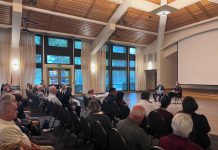This is a big year for us. After 10 years, we have rejoined the ranks of mainstream public school families. Although I knew them before, seeing the notable differences between private and mainstream public schools makes me sigh heavily every morning.
To begin to address those differences, Gilroy Unified School District has a new information officer, and that’s great. Morgan Hill Unified School District has an articulated vision for high academic achievement, and that’s great. However, let me reiterate what local school districts need to do to begin to attract the more than 2,000 private school students from South County back to their schools, and note this, GUSD: it’s more than marketing. Private school parents make tough decisions, and it’s not a simple lack of awareness of what the mainstream public schools have to offer that move them to opt for private schools.
Regular readers might recall the foremost complaint was lack of discipline and enforcement of rules. But it’s not just simply making the kids behave; it also means enforcement of stated guidelines, rules or assignments.
A simple example: morning drop-off/after-noon pick up is strange, to say the least. The back-to-school packet of information contained an announcement designed in paper size, color and font to alert the reader that it was important. It gave a map and detailed instructions of where drivers should drop off/pick up their children to ensure safety of the entire school community. Since then, I’ve witnessed at least half of the cars go to the part of the school that was specifically off limits (or maybe they’re sophomores and juniors and who don’t drive their own cars?). Still, in our one area, it’s chaotic, with cars stopping just anywhere. No one directs cars to go to the proper place at this time of year as there would be at a private school. (Even the school buses drop off/pick up students at the red-painted fire lane, rather than the yellow curb that says “bus zone”).
This seems innocuous, but here’s another: a summer assignment due on the first day of school. After giving up precious summer time to do the assignment (rather involved, too), students were told “well, since everyone didn’t know about the assignment, I’m not collecting it. However, you’ll get extra credit if you give a presentation.” Umm…what about the essay, and the analysis of a number of quotes? And, why didn’t every student know? With this result, why will students and their parents take next year’s assignment seriously?
I went home this morning, discouraged after seeing the school sign flash “Time flys (sic). Be on time.” I called and left a message on the school voicemail, (which has summer information on it, even though school has been in session a week). I was disconcerted to think that all the focus on standards for academic achievement in the schools meant only “learning the same as everyone else across the board” and didn’t seem to have anything to do with a level of quality in every facet of the school.
Compared to private schools, it seems mainstream public schools have been so beaten down and beaten back with decades of ridiculous lawsuits, repeated failures of “curriculum of the moment” reforms and formidable bureaucracies in administrations and unions that prevent any flexibility, that they have simply stopped standing up for themselves and for students to say what they mean and mean what they say.
There are glimmers of hope: the students. They include the children we know, other students we have yet to know and who we’ll never know, who step up and display pluck and leadership that could serve as examples to us adults who have stopped pushing for useful and needed change to save our stomachs from ulcers and our spirits from dissipating, if only we’d look.
I recognize there are many dedicated teachers and administrators. Both districts are attempting to institute “systems of structure” – code for centralization that will eliminate the chaotic personal coping mechanisms such teachers and staff have personally adopted to get anything they need done. However, district officials must be careful that such centralization doesn’t just provide information one way, from top-down, from inside to out, to the teachers and community, but also provides avenues to effectively receive feedback from them.
Then we could have community conversations (real ones) on local education! How cool would that be?
Columnist Dina Campeau is a wife, mother of two teens and a resident of Morgan Hill. Her work for the last seven years has focused on affordable housing and homeless issues in Santa Clara County. Her column will be published each Saturday. Reach her at
dc******@*****er.net.







